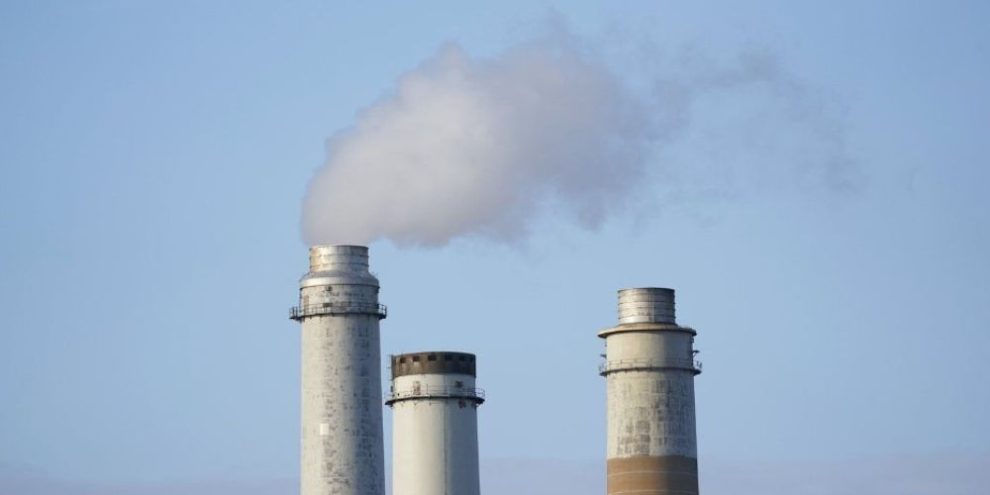
By Seth Borenstein
Earth is speeding to 2.5 to 2.9 degrees Celsius (4.5 to 5.2 degrees Fahrenheit) of global warming since pre-industrial times, set to blow well past the agreed-upon international climate threshold, a United Nations report calculated.
To have an even money shot at keeping warming to the 1.5-degree Celsius (2.7 degrees Fahrenheit) limit adopted by the 2015 Paris climate agreement, countries have to slash their emissions by 42% by the end of the decade, said the U.N. Environment Programme’s Emissions Gap report issued Monday. Carbon emissions from the burning of coal, oil and gas rose 1.2% last year, the report said.
This year Earth got a taste of what’s to come, said the report, which sets the table for international climate talks later this month.
Through the end of September, the daily global average temperature exceeded 1.5 degrees Celsius above mid-19th century levels on 86 days this year, the report said. But that increased to 127 days because nearly all of the first two weeks of November and all of October reached or exceeded 1.5 degrees, according to the European climate service Copernicus. That's 40% of the days so far this year.
On Friday, the globe hit 2 degrees Celsius (3.6 degrees) above pre-industrial levels for the first time in recorded history, according to Copernicus Deputy Director Samantha Burgess.
“It’s really an indication that we are already seeing a change, an acceleration,” said report lead author Anne Olhoff of Denmark’s climate think tank Concito. “Based on what science tells us, this is just like a whisper. What will be in the future will be more like a roar.”
It's dangerous already, said UNEP Director Inger Andersen.
“Temperatures are hitting new heights, while extreme weather events are occurring more and more often, developing faster and becoming much more intense,” Andersen said. The new report “tells us that it's going to take a massive and urgent shift to avoid these records falling year after year.”
The 1.5-degree goal is based on a time period measured over many years, not days, scientists said. Earlier reports put Earth reaching that longer term limit in early 2029 without dramatic emission changes.
To keep that from happening, the countries of the world have to come up with more stringent goals to cut emissions of carbon dioxide and implement policies to act on those goals, Olhoff said.
In the past two years only nine countries have come up with new goals, so that hasn’t moved the needle, but some countries, including the United States and those in Europe, have put policies in place that slightly improved the outlook, she said.
The United States’ Inflation Reduction Act, which has $375 billion in spending on clean energy, by 2030 would reduce yearly emissions of carbon dioxide by about 1 billion metric tons, Olhoff said.
That sounds like a lot, but the world in 2022 spewed 57.4 billion metric tons of greenhouse gases. Current country pledges would trim that to 55 billion metric tons, and to limit warming to the 1.5 degree mark emissions in 2030 have to be down to 33 billion metric tons. That's an “emissions gap” of 22 billion metric tons.
United Nations Secretary-General Antonio Guterres said “the emissions gap is more like an emissions canyon — a canyon littered with broken promises, broken lives and broken records.”
That’s why the report said the chance of keeping warming at or under 1.5 degrees is about one-in-seven or about 14%, “very, very slim indeed,” Olhoff said.
If the world wants to settle for a warming limit of 2 degrees Celsius — a secondary threshold in the Paris agreement — it only has to trim emissions down to 41 billion metric tons, with a gap of 16 billion metric tons from now, the report said.
Because the world has already warmed nearly 1.2 degrees Celsius (2.2 degrees Fahrenheit) since the mid-19th century, the report’s projections would mean another 1.3 to 1.7 degrees Celsius (2.3 to 3.1 degrees Fahrenheit) warming by the end of this century.
For two years countries have known they have to come up with more ambitious emission cuts targets if the world wants to limit warming to 1.5 degrees, but “none of the large emitters have changed their pledges,” said study co-author Niklas Hohne, a scientist at the New Climate Institute in Germany.
That’s why for the past few years the grim outlook from annual Emissions Gap reports barely changed, Olhoff said.
This year’s emissions gap report is accurate yet not surprising and the projected temperature range fits with other groups’ calculations, said Climate Analytics scientist Bill Hare, who wasn’t part of the report.
Guterres reiterated his call for countries to phase out the use of fossil fuels in time to keep the 1.5 degree limit alive, saying “otherwise we're simply inflating the lifeboats while breaking the oars.”
“We know now that the impacts of climate change, of global warming of somewhere between 2.5 and 3 degrees Celsius are going to be massive,” Olhoff said in an interview. “It’s basically not a future I think anybody would want for their children and grandchildren and so forth. The good news, of course, is that we can act and we know what we have to do.”
Banner image: (AP Photo/Joshua A. Bickel)





